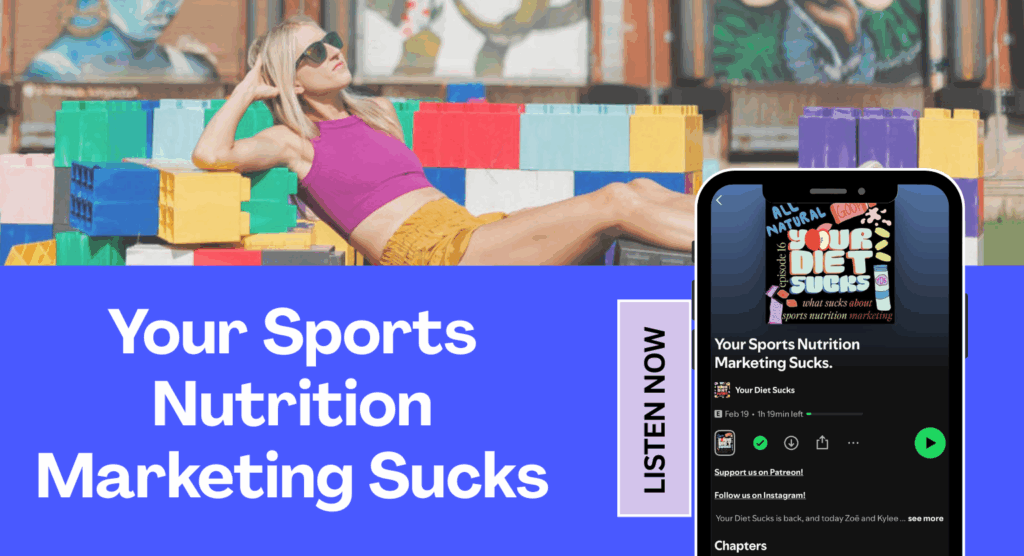“Clean,” “guilt-free,” “low-carb”… sounds healthy, right?
Not so fast.
In today’s sports nutrition market, buzzwords like these are plastered all over gels, drinks, and bars. And while they may sound virtuous, they’re often more about marketing than meaningful science.
Worse, these labels can confuse athletes, interfere with performance, and negatively impact your relationship with food.
If you’ve ever skipped a sports drink because it had “too much sugar,” only to crash mid-run…If you’ve ever second-guessed a gel because it wasn’t labeled “clean”…If you’ve ever felt guilty for needing actual carbohydrates to get through a hard training session…
You are not alone. And you are not the problem—the marketing is.
Let’s dig into what these popular sports nutrition labels really mean and how to make fueling decisions that support your performance and health—without falling into the trap of diet culture.

The State of Sports Nutrition Today
The global sports nutrition market is booming. With more runners, cyclists, and triathletes than ever before, the demand for performance-enhancing products—from energy gels to hydration mixes—is rising fast.
But along with that growth comes a flood of flashy marketing. Instead of emphasizing evidence-based performance benefits, many products now lean into wellness buzzwords to appeal to “clean eating” trends.
Some of these buzzwords include phrases like:
- “Clean energy”
- “Low sugar”
- “Free from guilt”
- “All natural”
- “Low carb”
The problem? These words aren’t regulated. There’s no legal or scientific standard that defines “clean,” “guilt-free,” or even “low sugar” in a performance context. That means companies can use them however they want—and often do so to make products seem healthier or more effective than they really are.
This can leave endurance athletes unsure of what to eat, nervous about “doing it wrong,” or worse—under-fueling during training or races.
Energy Gels and Buzzwords: What’s Really in Them?
Energy gels are a staple for many endurance athletes. They’re convenient, portable, and designed to deliver quick energy during prolonged efforts.
However, brands are increasingly marketing gels using claims like:
- “Made with clean ingredients”
- “No artificial stuff”
- “Guilt-free fuel”
These phrases sound positive, but they lack clarity. What does “clean” even mean? For some brands, it means organic. For others, it means fewer ingredients. But none of these definitions actually guarantee better performance or improved health.
In fact, obsessing over what’s “clean” can have the opposite effect—leading to restrictive eating, second-guessing your fueling plan, or not getting enough energy in when you need it most.
Instead of focusing on labels, ask:
- Does this gel provide a mix of glucose and fructose for optimal absorption?
- Can I tolerate it during long sessions or races?
- Does it fit into my overall fueling plan?
The best gel is the one that meets your energy needs and sits well in your gut—not necessarily the one with the prettiest packaging or trendiest claims.
Diet Culture in Sports Nutrition
Diet culture isn’t just a problem in the general wellness world—it’s crept into endurance sports, too.
Words like “clean” and “guilt-free” attach moral value to food. They imply that some choices are “good” and others are “bad.” This can lead athletes to internalize shame around their nutrition habits, even when they’re doing exactly what their bodies need.
This kind of messaging is especially damaging for endurance athletes who rely on high-carbohydrate diets to fuel performance. It can create fear around foods that are actually essential—like sports drinks, sugar-based gels, and higher-calorie snacks.
Here’s what diet culture might sound like in your head:
- “I shouldn’t need this much sugar.”
- “I’ll burn it off anyway, but I feel guilty eating it.”
- “This one has better ingredients, so I should like it—even if it makes my stomach hurt.”
You deserve to fuel without guilt. Sports nutrition is not about being “good” or “bad”—it’s about performance, recovery, and honoring your energy needs, and that includes carbs, sugar, and products that may not check every “clean” box.
If you want to learn more about the effects of “clean eating” claims on endurance athletes, check out our blog post Athletes and Orthorexia in The Age of Clean Eating.

The Problem with “Low Sugar” in Endurance Fueling
Sugar gets a bad rap—but for endurance athletes, it’s a powerhouse.
Carbohydrates, including simple sugars like glucose and fructose, are the body’s most efficient source of fuel during intense or long-duration exercise. When you’re out for a multi-hour training session or race, your body burns through stored glycogen and needs fast-digesting carbs to keep going.
“Low sugar” bars and gels might seem healthier, but they can seriously undercut your performance.
Some symptoms you might experience when using “low sugar” options include:
- Fatigued earlier than expected
- Lightheaded or dizzy
- Unable to sustain pace
- Irritable or mentally foggy
- Slowed recovery post-workout
All of these can be signs of under-fueling.
Many “low sugar” products also rely on alternative sweeteners like sugar alcohols or stevia, which can cause gastrointestinal issues for some athletes. Not ideal when you’re mid-marathon or halfway through a century ride.
Instead of fearing sugar, embrace it as the quick-access energy your muscles crave. A well-timed, appropriately dosed gel or sports drink can be the difference between finishing strong and bonking hard.
“Low Carb” Sports Drink? Think Again
Sports drinks were originally designed to replenish carbohydrates and electrolytes lost through sweat and exertion. But in recent years, more brands have introduced “low-carb” or “keto-friendly” versions.
While these might appeal to wellness trends, they don’t align with the physiological demands of endurance exercise.
During high-intensity efforts, your body relies primarily on carbohydrates. Fat oxidation becomes more important at lower intensities, but it’s slower and less efficient. If you’re racing or pushing hard, a low-carb drink simply won’t keep up.
Potential consequences of low-carb fueling include:
- Muscle fatigue
- Decreased time to exhaustion
- Impaired recovery
- Compromised immune function post-exercise
Endurance athletes need carbohydrates not just to perform, but to recover, adapt to training, and reduce injury risk. A “low-carb” sports drink might work for someone taking a walk—but it’s not enough to sustain you through a brick workout or back-to-back long runs.
How to Choose Smarter, Not Trendier
So how do you navigate the noisy world of sports nutrition marketing? Start by focusing on function, not buzzwords.
Here are a few tips:
- Look for performance-driven formulas. Prioritize products with a clear breakdown of carbohydrates, sodium, and other ingredients that directly support endurance.
- Ignore morality language. “Clean,” “guilt-free,” and similar claims don’t mean much—and they don’t determine whether a product works for your body.
- Know your needs. Your fueling plan should reflect your training intensity, duration, and personal tolerance—not a trend.
- Experiment during training, not race day. Use long sessions to find out which products work best for you—then stick with what’s tried and true.
- Be skeptical of extremes. If a product claims to solve all your problems, boost your performance and make you healthier and save the planet—it might be overpromising.
At the end of the day, sports nutrition is deeply individual. Your best strategy is the one that keeps you energized, helps you recover, and makes you feel confident—not conflicted—about your choices.
Tips for Choosing the Right Supplements
Navigating the supplement aisle can be overwhelming. Here are a few key principles to keep in mind:
- Choose third-party tested products: Look for NSF Certified for Sport, Informed-Sport, or BSCG logos to ensure safety and purity.
- Avoid mega-doses: More isn’t always better—especially with fat-soluble vitamins and stimulants. Do not take more than the recommended dose.
- Read ingredient labels carefully: Be aware of artificial sweeteners, allergens, and filler ingredients.
- Work with a professional: A sports dietitian can help you assess your needs and avoid unnecessary or ineffective products.
Remember: supplements should fit into your training plan, not the other way around.
If you’re curious about how supplements have evolved and which ones are worth your time (or not), be sure to check out our Your Diet Sucks podcast episode The Science of Supplementation.
Let’s Redefine What Smart Fueling Looks Like
It’s time to take back the narrative around sports nutrition.
You don’t need “clean” ingredients to be a strong athlete. You don’t need “low sugar” to perform well. And you certainly don’t need to feel guilt for eating in a way that supports your training.
Fueling smarter means understanding what your body truly needs—especially during endurance efforts. It means letting go of arbitrary food rules and trusting that performance nutrition might look different from wellness trends. It’s about using food as a tool for strength, resilience, and joy—not as something to obsess over or fear.
If you’ve ever felt confused by labels or discouraged by the pressure to eat a certain way, know this: you are not the problem. You’re just navigating an industry full of noise. And you deserve support, clarity, and confidence in how you fuel.
You’ve got this. And if you need help figuring it all out, I’m here.
Want to Learn More About Fueling Without Fear?
If you’re tired of the buzzwords and just want clear, compassionate advice about fueling for performance—you’re not alone.
Tune into this podcast episode where we break down the truth about “clean” eating, sugar fears, and why endurance athletes need to stop moralizing their nutrition.

Click here to listen on Apple or Spotify.
Whether you’re new to sports nutrition or have years of training behind you, this episode will help you fuel with more confidence—and a lot less guilt.
Be The First To Comment